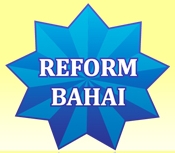Excerpts from Julie Chanler, From Gaslight to Dawn: An Autobiography. The New History Foundation, 1956. 413 pages.
"They [NY assembly] did not want Sohrab in New York. Even his friends, who looked toward him with hope, were tentative and uncertain. Why? The reason was simple. Ahmad had been privileged, possibly beyond all others. He had been brought up under the care of Abdul Baha, after which he had served his Master as secretary and interpreter for eight years. He knew Abdul Baha's way of teaching; he knew what he wanted better than anyone else. Abdul Baha had said that the Bahai Cause could never be organized, and it was organized to the eyes. The Bahai authorities planned to organize it yet more. Ahmad was a menace to their projects. He had to be eliminated" (173).
"The idea of forming a movement of our own had never entered our heads. We just wanted to bring in the people and let the Bahai Cause handle them after that" (189).
"We had no fixed plan. We just kept active, taking our beloved Cause with us in whatever we did and wherever we went. Often it seemed that we had accomplished little, then looking backward we realized that much good had been loosed over the earth because of the Caravan, and the good had been welcomed and assimilated by minds without number. The world was richer because of our efforts. This we had to admit. I believed, many opinions to the contrary, that we were better off with no thought-out campaign.... Maybe in the future, when able minds would be concentrating on the work, professional planning might be made. We hoped so" (371).
In Haifa and Acca [1954-1955], Sohrab met many Bahais who were under the ban of the Guardian and felt happy and privileged to spend hours conversing with them. Wherever he went, spies of the Administration followed him and, although he could scarcely believe his senses, he had to admit in his Diary that his actions and words were duly observed and recorded (381).
"It was whirlwind trip lasting exactly a month. Ahmad returned in a very exhausted state. Then three days after his arrival, I received a document from Mr. Leroy Ioas, representative of Shoghi Effendi in Israel, which made me feel that we all must have shifted back to the Middle Ages. The letter, which was based on the report of the spies, gave a day to day account of Sohrab's activities while in the Holy Land and continued with an appeal to me to free myself from the 'sinister influence and the entangling webs of this evil genius.' Mr. Ioas went on:
"No doubt you will be shocked as I have been and thus knowing too what a state of spiritual degradation he has fallen, you will wish to retrieve your own relationship to the Cause of God and seek divine solace under the canopy of Abdul Baha's Divine Grace."
I always found it easy to answer such letters. The last paragraph in my reply to Mr. Ioas read:
"Ahmad Sohrab has never deceived me on his attitude. He loves Baha-O-Llah and Abdul Baha with everything that is in him, and he would gladly have served the Guardian, if the Guardian had allowed him to do so in honesty and self-respect. When people question him, reporters or anybody, he says what he thinks. He is not trying to undermine the Guardian, because he considers that the Bahai organization is not of much account. He is not impressed by structures, flower-beds and statuary, but only by the deeds of the people. He is aware of the misery wrought by the Guardian in Abdul Baha's once happy family, now cleft, scattered and hopeless, and he knows that no golden dome and no far-flung gardens can counterbalance the waste of talents and the breaking of hearts.
You speak of Ahmad's 'spiritual degradation' and here I will let Ahmad answer for himself. In reading your letter he exclaimed: 'Why did not Mr. Ioas have the courage to say this to me, and discuss these things with me, instead of sending his spies to report? I was right there [Haifa]. He could have heard whatever I actually said from my own lips. No statement which I made would have been altered because of his presence. I knew that the Guardian's spies were everywhere....'"
"Of course Ahmad could not refrain from replying to Mr. Ioas on his own part and, after doing so, a pamphlet entitled Three Letters (Mr. Ioas', mine and Ahmad's) was printed and lavishly mailed throughout Israel. We are not looking to attack the Bahai organization, but when it attacks us we are quite ready to express ourselves" (382-383).
PDF: Julie Chanler, From Gaslight to Dawn: An Autobiography The New History Foundation, 1956. 413 pages. (26 megabytes).
Scholarship worthy of the name cannot be done without confronting the Bahai history to which Ruth White, Julie Chanler, and Mirza Ahmad Sohrab testify.
It should be noted that the enormous collection of Bahai and New History Foundation material, including such artifacts as a lock of Baha'u'llah's hair, which Julie Chanler discusses in her autobiography, was acquired by the Baha'is of Wilmette, after the death of Sohrab and Julie Chanler. According to Lili Townsend, Chanler's grand-daughter, during a 2007 telephone conversation, stated her own mother, Elsie Benkard-Clarke had bestowed the papers on the NSA of Wilmette upon the representation that they would be made available to researchers. Mrs. Townsend went on to add that she didn't believe anything had ever been done with the papers and clearly had no idea what had happened to them.
